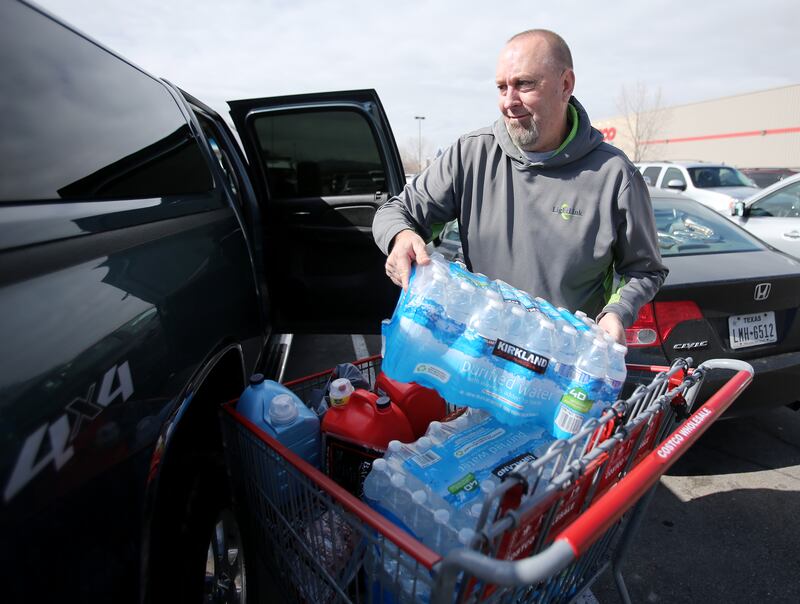SALT LAKE CITY — This morning I realized I had run out of toilet paper at my apartment. No big deal, I thought, and I popped over to my grocery store to pick some up. But when I got to the toilet paper aisle, I was shocked: there wasn’t a single roll in the store. I returned home empty-handed, and went on Amazon to order some. No luck — it was all sold out there too.
Concerns about the spread of coronavirus are spurring people to stockpile necessities. But some of the things people are buying in large quantities, including toilet paper and water, don’t seem to make much sense. If quarantines only last two weeks — the incubation period of the virus — people don’t need hundreds of rolls of toilet paper. And if people’s faucets are still running fine, then why are people buying cases and cases of bottled water?
The answer may have less to do with what people actually need, and more to do with the way the human brain reacts to the anxiety produced by a growing pandemic, said Frank Farley, a professor at Temple University and a past president of the American Psychological Association.
“The driving force is uncertainty, and uncertainty is a prime source of human fear,” said Farley.
But as necessities begin to run out, there could be moral implications to stockpiling large amounts of supplies. After all, because my neighbors have already bought out my local grocery store, I’m left wondering where I’ll find enough toilet paper to last the week.
‘Taking back control’
A quickly spreading and potentially deadly pandemic is frightening and impossible to predict, said Farley, and some people may engage in “panic buying” as a means of reclaiming some feeling of power and control over their feeling of safety.
“It’s about ‘taking back control’ in a world where you feel out of control,” Paul Mardsen, a consumer psychologist at the University of the Arts London, told CNBC.
It’s no surprise that water and toilet paper are the first to sell out, said Farley, because in many people’s minds they are two things that are most fundamental to normal bodily function.
“Water is key for human life,” said Farley. “So we shouldn’t be surprised that people want to build up a stock of water.”

Some of the instinct to buy water may be a residual impulse from other natural disasters in which the water supply is threatened, he said. For example, the Red Cross website lists water as the first item to include in a “survival kit.”
And because most people aren’t directly familiar with the nuances of the water supply mechanism, some may be concerned that because human workers are involved in different stages in the water supply process, that theoretically the water supply could become contaminated if one of those workers were to become sick, he said.
And contaminated water isn’t out of the realm of possibility for American cities, he said, with the Flint water crisis looming large for many Americans.
“People may be feeling that they’re going to be sort of imprisoned in their homes for the short term, and if they’re forced to drink tap water, they may be concerned about a ‘Flint factor,’” he said.
‘A vote of no confidence in authorities’
A lack of clear guidance from authoritative sources may be spurring people to go on buying sprees for toilet paper and water, said Baruch Fischhoff, a professor of public policy at Carnegie Mellon University.
In a time of crisis, whether a natural disaster or a pandemic like this one, people look to their leaders for reassurance and guidance, said Fischhoff. But when given incorrect, unclear or confusing information, that may spur people to worry even more and take matters into their own hands, he said.
President Donald Trump downplayed the spread of the coronavirus on Twitter earlier this week, which conflicted with guidance from U.S. health authorities that included much more serious and grave predictions.
“In the U.S., people are receiving conflicting messages from the CDC and the Trump administration,” said Sander van der Linden, an assistant professor of social psychology at Cambridge University, to CNBC. “When one organization is saying it’s urgent and another says it’s under control, it makes people worry.”
For example, if people aren’t explicitly told that necessities such as toilet paper will be provided to those that are quarantined, or that the water system will not be affected or contaminated by the virus, then they may begin to prepare for the worst by stocking up on all the supplies they can find, said Fischhoff.
“I think that the buying is a vote of no confidence in our authorities who haven’t provided explicit assurances that people will be provided for,” he said.
A moral failing?
In a time of pandemic, people need to be thinking about not only what can ensure their own health and survival, but that of others in a global community, said Fischhoff. For example, while young people are less likely to die from the virus, they can still give the virus to more vulnerable populations — such as the elderly or immunocompromised people — if they do not take appropriate precautions.
The same logic applies to the morality of stockpiling large amounts of supplies in your local grocery store, he said. If you take far more cases of water and toilet paper than you might actually need if you were to be quarantined, then you may end up depriving other people of the supplies they need — people who actually may be a greater risk of severe illness than you.
“If somebody knows that they’re buying this pack of 95 face masks, and they’re doing it because they’re protecting themselves and depriving people who really need it, such as immunocompromised people or people in hotels, then that’s arguably unethical behavior,” he said.


